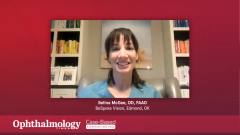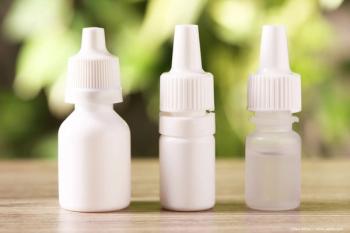
Patient Case #2: Managing Dry Eye in a Patient With Advanced Glaucoma
Selina McGee, OD, FAAO, reviews a challenging case involving a patient with advanced glaucoma on multiple medications, grappling with multifactorial dry eye.
Selina McGee, OD, FAAO: Our second case is a 76-year-old [man] who presented for a dry-eye consult. He came to me from my glaucoma surgeon. And I have found that because I optimize the ocular surface, my surgeons know this, and I work with several. Now they'll refer patients back to me when they even struggle with somebody's ocular surface because that's not their specialty. They need to be in the operating room doing the things that they've been trained to do. And I can manage the ocular surface for them in these cases. And so this was a referral from my glaucoma surgeon. And [this patient] had had burning, itching, dry, painful, red, gritty watery eyes for months. He has advanced glaucoma. His review systems [are] unremarkable, but he has longstanding glaucoma, status post [blepharitis] in his right eye.
Medications he's currently already on are cyclosporine twice a day, Oasis tears as often as he can get them in, Combigan twice a day, and Lumigan at night. So he's got a lot happening on his ocular surface. When we look at his case presentation, his dry eyes 20/60 pinholes of 20/50, his left eye has got 20/20 vision, and in the anterior segment, he's got collarettes with severe telangiectatic vessels.
He's got Demodex blepharitis and ocular rosacea. Many times those are going hand in hand. And when we look at his conjunctiva, he's got 3-plus injections. So the redness is what bothered him and how he feels. Remember, in patients [who] have glaucoma, when their eyes feel bad and they're putting drops in, a lot of times they'll stop taking their glaucoma drops because their eyes feel so bad. So it's very important for us to manage their dry eye disease, because the very medications that are helping them with their eye pressure and helping them long-term with their vision, [adherence] goes way down, and we don't want that. His corneal epithelium was pretty beaten up. He had SBK [sub-Bowman keratomileusis] inferior both eyes. His tear breakup time was dismal at 2 seconds and 3 seconds. And he was making the right amount of tears. Tear meniscus height was 0.34 and 0.25. PERRLA [pupils, equal, round, reactive to, light, accommodation] was normal, EOMs [extraocular movements] full. His speed was 17 out of 28, very significant. Look at his osmolarity, 337, 339. And then InflammaDry with MMP-9 showed positive right eye and left eye. His pressures were 6 and 15. No surprise there [because[ he had a [blepharitis] in that right eye. And for his assessment, he does have [keratoconjunctivitis sicca]. He has ocular rosacea. He has meibomian gland dysfunction and he has Demodex blepharitis.
We’re going to address all of those things. We will continue his immunomodulator, but I will also add varenicline twice a day with a lid cleanser. And at this point, as we publish this and talk about this, I would add varenicline twice a day and I would also add lotilaner twice a day for 6 weeks to clean up his lids too. But we added varenicline in this patient because he's already taking multiple drops. I don't want anything else on that ocular surface because of his glaucoma.
And I also chose IPL [intense pulsed light] treatment because it's ocular sparing and I need to work on his ocular rosacea. I treat the root cause of what's happening with the rosacea and his telangiectatic blood vessels spilling inflammation on the front surface.
So for him, I'm scheduling his IPL every 2 weeks. We added varenicline twice a day with the lid cleanser. We did his IPL that day and I asked him to come back in 2 weeks.
Transcript is AI-generated and edited for clarity and readability.
Newsletter
Don’t miss out—get Ophthalmology Times updates on the latest clinical advancements and expert interviews, straight to your inbox.






























